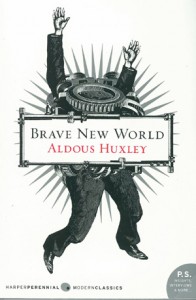Are We Living in the Brave New World?
 Recently I have read the book “Brave New World“, written by Aldous Huxley. Although the book was published in 1932, it made me wonder how the ideas of a future society that Aldous Huxley brought forward are now applicable to our society.
Recently I have read the book “Brave New World“, written by Aldous Huxley. Although the book was published in 1932, it made me wonder how the ideas of a future society that Aldous Huxley brought forward are now applicable to our society.
Of course, for everyone who has read the book, it is clear that Aldous Huxley has pictured a totalitarian state which is very extreme, however, I think some of the aspects can now be seen in the way we live. I will shortly reflect on some elements of the book and try to compare them to situations we are experiencing now. I am well aware that analyzing this kind of book and comparing it to our society is an undertaking that deserves more than a small post, but I will try to grasp some of it anyway.
Sexual Reproduction
One of the main topics in the book is sexual reproduction, or in this case, the lack thereof. In Brave New World people are created in special centers, where there’s no sexual intercourse needed to create a child. The nuclear family – mother, father, child – does not exist in this world and is even frowned upon (think about the part that the Director had to resign after the finding that he created a child in the traditional sense). Children are created in some kind of battery cage we use for chickens. During the creation of the children, they will be divided into different classes, and after they are born (or finished, because being born doesn’t exist) they will be conditioned to fit in this class. For example, the Alpha Plus class consists of people smarter, taller, and prettier than the classes beneath it, and will be conditioned during childhood as superior to the others. In this sense, the World State in Brave New World, is reassuring that fine offspring is created, in order to keep the society stable. In a way, this is comparable to the technologies that have been developed in the past couple of years, which enable parents to decide whether they will keep a child that has Down Syndrome or even which eye color the child should have, otherwise known as the “Designer Baby“. This genetic engineering raises questions about what this interference will do to society. As Silver argues, Designer Babies could create a world wherein the ‘superior humans’ will look down on those who were not manipulated during their time in the belly, creating the same effect of classes as described in Brave New World.
Controlling the Masses
Another aspect I would like to discuss is how Huxley shows the passiveness of the people living in the Brave New World. They are all happy with their lives (except for the protagonist), and anyone who deviates from the norm of life – norm being taking Soma, having sex with more than one person – will be expelled to an island. People are conditioned in a way that they are happy with how they live. In an interview Huxley compares his thoughts with those that come forward in the book 1984 by George Orwell: in ‘1984’ the masses are controlled by a constant message of terror, whereas the people in Brave New World are controlled by providing them with fun things to do (and drugs called Soma). He states that in order to keep a society stable and the people happy, you will need the consent of the ruled. The ruled should actually love their ‘slavery’, and in contrast to 1984, this is the case in Brave New World. One example from our time is the use of Gamification to make people do tasks they would normally not like to do, but because of the game element they will do it anyway. Here are some examples of how gamification is used. Gamification is rectified by claiming that it is for the people’s own good, and therefore it is ok to interfere.
So are we living in the Brave New World? Although the picture painted by Huxley seems extreme, it translates well to some technologies and uses in our present day society. I’ve discussed two of the book’s elements, but in my opinion there are more that are relevant, such as the use of Fordism and the Savage. If you’re interested in a broader analysis, please check this podcast. Personally, I feel like Huxley comes across too pessimistic at times, but if you approach his view as an apocalyptic metaphor, it seems surprisingly relevant today.
References
Huxley, Aldous. Brave New World. Chatto & Windus, London: 1932.
Silver, Lee M. Remaking Eden: Cloning and Beyond in a Brave New World. Harper Perennial, 1998.